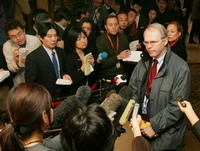North Korea demands to be taken off US terror list
A failure by the United States to take North Korea off a list of state sponsors of terrorism could give the North a justification for walking away from six-nation nuclear disarmament talks.

Removal from the U.S. terror list is a key North Korean demand, and, in an effort to reach a nuclear settlement, the United States agreed in February to begin that process. U.S. ally Japan and many U.S. lawmakers, however, oppose the action.
South Korean Foreign Minister Song Min-soon said the U.S. has pledged to take the North off its terror list in return for North Korea fulfilling promises to scrap its nuclear programs.
"Any side balk at this agreement, that justifies others to renege," he said in English at the Woodrow Wilson International Center for Scholars. "We should not give each other any justification of reneging from this agreement."
Japan, one of the nations involved in the nuclear talks, has pushed the U.S. not to take the North off the list until Pyongyang provides details about Japanese citizens kidnapped by North Korean agents in the 1970s and 80s; Tokyo has also refused to provide aid to the North called for in the nuclear talks until the matter is resolved.
North Korea has not been tied directly to terrorism since its agents planted a bomb on a South Korean commercial jetliner in 1987. But U.S. hard-liners fear the Bush administration, in taking the North off the list, would be sending a dangerous signal to a country that exploded a nuclear bomb and test-fired missiles last year.
A team of U.S. experts has begun disabling North Korea's nuclear facilities. If completed, it would be the biggest step the North has taken to scale back its nuclear programs. U.S. officials said the experts plan to take steps that would mean it would take at least a year for the reactor to be restarted.
The North shut down its sole operational reactor at Yongbyon, north of the capital Pyongyang, in July and promised to disable it by year's end in exchange for energy aid and political concessions from the other countries involved in talks on its nuclear program: the U.S., China, Japan, South Korea and Russia. U.S. officials hope to dismantle the reactor next.
Song said that a failure by negotiators at the nuclear talks could spur other Asian nations to pursue their own atomic bombs.
"This is a great danger," Song said. "If that is the case, we would see the nuclear dominoes. That would be a road to disaster."
Song said South Korea was committed to making sure North Korea relinquishes all of its nuclear programs and weapons.
"We cannot live in this kind of small room with someone who is holding a hand grenade with the safety pin off," Song said.
He also spoke of South Korea's coveted goal of talks on an eventual peace treaty to replace the 1953 cease-fire that halted the Korean War.
Those talks, he said, would begin when negotiators see "tangible and persuasive progress" in North Korea's nuclear disablement efforts.
Secretary of Condoleezza Rice, at a joint press conference with Song on Wednesday, indicated the U.S. would approach peace talks more cautiously.
"We would want to have evidence of real denuclearization that is really a strategic choice by North Korea, that they're not going to try to reverse course," Rice told reporters.
Subscribe to Pravda.Ru Telegram channel, Facebook, RSS!


